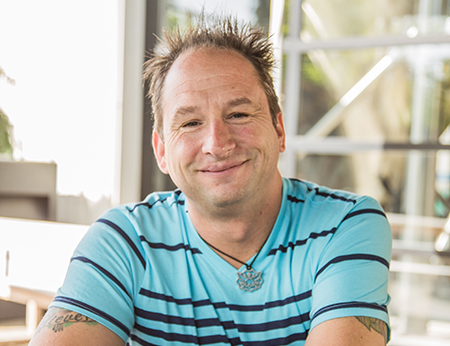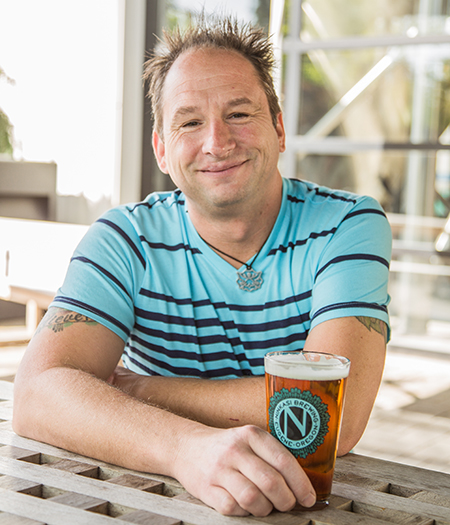

Ninkasi Brewing Company started like many other brewing companies — with a couple of founders passionate about beer and the brewing process.
In 2006, Nikos Ridge and Jamie Floyd launched Ninkasi Brewing Co. “I started brewing beer when I was 17 as a homebrewer in 1995,” said Floyd. “I had my first professional brewing job at Steelhead Brewery and worked there for a total of 11 years, but 10 years in the brewery.”
Ridge and Floyd had a mutual friend that handled decorative medal work and tap handles. “Nikos was off at NYU doing college and then working on the stock exchange floor, but he’d come home and visit family, and as a result we became acquaintances. He ended up moving back to Eugene, [Oregon], being done with the financial sector, and we were able to come together and over some beers I had said I wanted to start a brewery and he said that if I was ever really into it he’d be down.”
Floyd has had a passion for giving and cultural support since graduating from the University of Oregon with a sociology degree. He had been offered a job a brewery (Steelhead) and he figured being a brewer was a good way to give back to the community.
“I said I’d try it out and realized in that moment that what I should be doing is making beer,” said Floyd. His cultural support was to nurture the beer, just as “village brewers have always done.”
According Floyd, Ridge had a desire to do something “more real” than moving finances around on the stock exchange. “He could use his financial background in the business, and it’s helped us grow to 106 employees,” explained Floyd.
Even before he became a brewer Floyd had a desire to own his own business. So, the entrepreneur spirit was alive in him when he was ready to strike out with Ridge. “There were a couple of times I thought about starting breweries, but it just wasn’t the right time for whatever reason,” he said. “For me I had finally made the decision that I needed to move forward. I had actually quit Steelhead to force myself to actually get going. Having met Nikos in that time period definitely galvanized it being the right time.”
Being a downturn for the economy, there were some opportunities for young entrepreneurs that Floyd doesn’t believe are still in place. “Things have changed enough in the eight years we’ve been open, but there are different opportunities now,” he said. “I’ve been in industry a long time. I’ve watched things and felt like I was ready to try to open my own.”
Floyd and Ridge weren’t truly looking to make something that was internationally known. They wanted to create a regional brewery and “really give some meaning to this area,” said Floyd. “We’ve had a lot of fortunes early on.”
The name Ninkasi comes from Sumerian language and represents the goddess of fermentation. “The Sumerians weren’t the first to make beer, but they invented written language, so they were the first to write about beer,” explained Floyd. “At an age in time when we were developing, not just written but oral communication as humanity, beer was there to support all of that.
“What’s awesome for us is that we were able to acquire that name for our own. It had been trademarked at one time. But at some point they went out of business and we were able to trademark the name.”
Ninkasi has been striving to achieve its Leadership in Energy and Environmental Design (LEED) Certification to become an environmentally sustainable brewery. “It takes an incredible amount of documentation,” explained Floyd. “Our contractor pretty much spent most of their time processing that information so that it’s registered. There’s a lot of certification in all that stuff that goes on, so we’re still in the middle of that. It could be sometime in 2015 that we receive that level of certification. We’ve certainly have worked for that.
“The new brewhouse especially is incredibly efficient compared to a lot of brewery operations — there’s some cool stuff involved.”
In addition to Floyd’s degree from the University of Oregon, he also had a double minor in environmental studies and women’s studies. “At the brewery we are choosing to acknowledge that we are part of the food chain,” explained Floyd. “Living in Oregon we are fortunate to be close to our raw ingredients. About 17 percent of the hop crop is grown in Willamette Valley, which Eugene is located in. Our grains are grown close, and our malts are grown close, we have an opportunity here to be close to the ingredients and processes.
“But even on the most pragmatic situation, if you’re running a business the price that one earns does not go up nearly as much as the cost of input goods, raw ingredients, energy stainless steele. All these things are commodities that fluctuate typically on the upward scale, even if there’s little recesses, there’s still an upward trend. The way we can benefit and profit as a company to be able to pay back the debts is to become more efficient as a company.
“It’s kind of a dualistic nature to it. One we want to use less footprint to make the beers, but also as a practical business measure, the more efficient you can get, the more return on your investment.”
Floyd and Ridges long-term goals are to make a sustainable brewery, develop the barrel number to pay back the construction and to sink into the company culture and truly enjoy making beer.



Be the first to comment